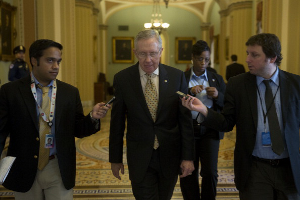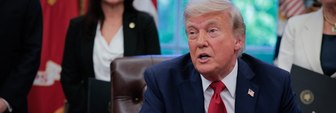The Senate Majority Leader's decision in November to push thru a controversial change to Senate rules was his defining moment.
“Follow the leader,” or not follow, depending on your partisan viewpoint, might be the best way to describe how Congress fared last year. And that may point to few breaks in the all-too usual gridlock on Capitol Hill in 2014.
Those were some of the key findings of a YouGov elite opinion survey of 100 Democratic and 117 Republican Party activists and operatives, including media consultants, pollsters, lobbyists and interest group leaders, conducted January 3-8.
Democratic and Republican elites were asked to choose “which Member of the Senate or House had the biggest impact on what Congress did or did not do” in 2013. Not surprisingly, in a year of slim legislative accomplishments, the party insiders tapped the top two Congressional leaders, Senate Majority Leader Harry Reid (27%) and House Speaker John Boehner (27%) as the two most impactful lawmakers on Capitol Hill.
In the eyes of party insiders, two words best characterized Reid’s impact in 2013: “nuclear option.” The Senate Majority Leader’s decision in November to push thru a controversial change to Senate rules that enables the chamber to approve executive and judicial branch nominees (except for the Supreme Court) with a simple majority rather than a supermajority of 60 votes was his defining moment.
“He had the guts to go nuclear,” said one Democratic insider, a view shared by several others.
Reid’s other signature stance was his unbending opposition to GOP demands for significant alterations to the Affordable Care Act (aka Obamacare), in exchange for resolving a budget impasse that lead to a 16-day government shutdown in October.
“He announced a ‘no-negotiation’ strategy and stuck to it,” acknowledged a Republican insider. “He shut down all the Republican shenanigans and stood his ground,” added a Democrat.
Of course, others saw Reid’s resistance in less favorable light. “Both parties have made their mistakes,” said one party operative, “but Harry Reid bears the brunt of the blame for what has, and has not occurred in Congress. What’s more, Reid has now completely transformed [himself] from a once soft-spoken, vote counter and floor leader to a full-on political operative more interested in fixing the blame than fixing the problem.”
While some insiders viewed Reid as an obstructionist, others chastised Boehner for not being able to control the obstructionist bloc in the House Republican conference.
“Boehner was backed into [a] corner by Tea Party [Members] leading to government shutdown,” said one Republican insider. “Boehner ran the ‘do-nothing’ House, or rather, it ran him,” echoed a Democrat.
While many insiders say that October was a crisis point in Boehner’s leadership, many also think he deftly rebounded from that budget impasse.
“He was ultimately made decisions to help end the government shutdown, despite not having a majority of his majority, and was helpful in pushing the [budget] deal at the end of the year,” said Republican Insider.
The same Republican operative who said that Boehner had been boxed into a corner by the Tea Party also noted that the Speaker “ended the year stronger with conservatives solidly behind him.” Another Republican said, “Boehner, maybe, has begun to get most of his team to read the same playbook.”
Neither Reid nor Boehner were selected as impact players for their ability to craft legislative compromises. They both seemed to owe their status to the institutional power they wield and their grip on the legislative docket. Indeed, they were often described more like toll keepers than dealmakers.
“He controls the Senate agenda and neither the House [of Representatives] nor White House can really accomplish much if he is not playing ball,” said one Republican operative of Reid. Added a Democrat, “Anything that moved or did not move was up to him.”
Likewise, Boehner was described as the “gatekeeper for the House.” Said one Democratic Insider succinctly, “It’s not happening if he doesn’t let it.” As a Republican explained, “He decided what would or could get through the House.”
And speaking of “not happening,” the only other Member ranked near the two leaders was conservative crusader, first-year freshman Republican Sen. Ted Cruz of Texas, cited by 24% of the insiders as having the greatest impact on Congress in 2013.
“His efforts and leadership in shutting down the government, without any plan, had a direct impact on the public’s perception of the GOP—in the negative,” said one Republican Insider. “For better or worse, Cruz was the mouthpiece for the Tea Party activism limiting congressional compromise,” said a Democrat.
Ironically, some Insiders also believe that by leading many Republican Members to the brink in the government shutdown, Cruz also created the opportunity for the budget deal that followed in December.
“His managing of the shutdown not only controlled that situation, but the backlash he instigated laid the foundation for the budget agreement between [Senate Budget Committee Democratic chairwoman Patty] Murray and [House Budget Committee GOP chairman Paul] Ryan,” said one GOP insider. Cruz “gummed up the works and inadvertently created breakthrough moment for bi-partisanship,” concurred a Democrat.
The only other Member of Congress to crack double-digits in this ranking was the House Budget Committee chief Ryan (10%).
So what about this coming year in Congress, will big deals get done? Don’t count on it, say the party elites.
When asked which one or two pieces of legislation “would you most want your party to compromise to achieve bi-partisan agreement in 2014,” the only measure that mustered an overall majority from the insiders was immigration reform, cited by 61% of Republicans and 48% of Democrats.
Insiders in both parties were much less willing to compromise on other major bills including entitlement reform, Republicans, 41%, Democrats 30%; tax reform, Republicans 26%, Democrats 33%.
Perhaps most ominously, only 19% of Republican insiders and 17% of Democrats said they wanted their party to compromise in order to raise the debt ceiling, which could foreshadow another round of high stakes brinksmanship before the federal government’s borrowing authority lapses in February.
On gun control, 21% of the Democrats said they’d be willing to grant concessions, but only 3% of Republicans felt that way.
Both parties had a small give-no-quarter crowd: 9% percent of the Democratic insiders said they would compromise on none of these measures compared to 5% of the GOP Insiders.
-- James A. Barnes
James A. Barnes is a veteran Washington journalist who created the National Journal Political Insiders Poll and conducted elite surveys for CNN during the 2012 Republican presidential nominating contest. The YouGov Political Insiders Survey is comprised of interviews with leading players in political and policy campaigns in Washington D.C. and in state capitals around the country.
Topline results can be found here.
Detailed survey results can be found here.
Image: Getty Images









